Part 20: Legend Of The North
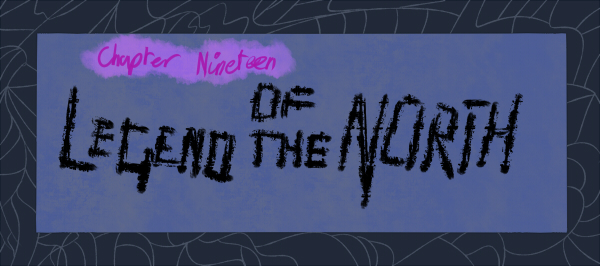
It is important to remember that greatness is not how smart you are. Greatness is not how lucky you are. Greatness is not what sits on your head, it's not what you carry in your heart. It's not what you are. It's not who you know.
Greatness is what you do.
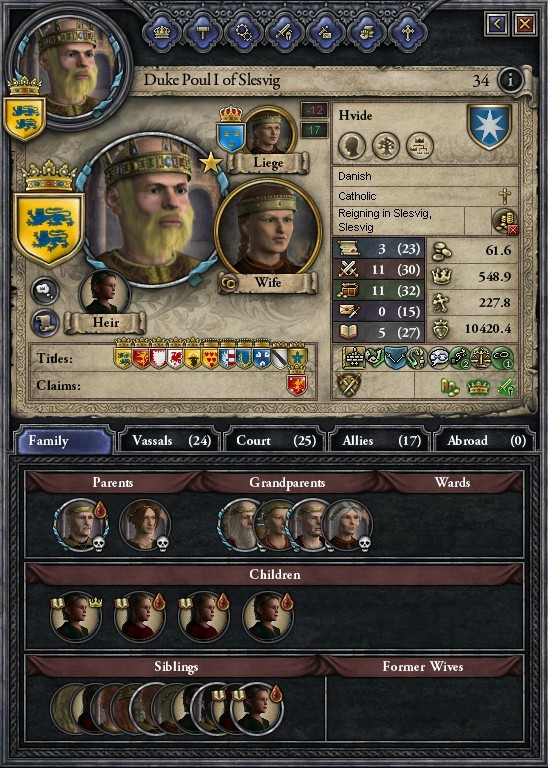
Duke Poul. King-Consort of Sweden, the scion of Hvide. Came to power through pure happenstance and united the Crowns of Sweden and Denmark through a young girl's poor decision. The way many saw it, that was enough. All he had to do was not fuck it up.
Their wedding was a curious moment. Duke Poul was large and boisterous, a man with muscles like twisted cables, armed with a ceremonial Danish axe - but he was strangely shy around his new bride. Not as shy as the bride herself - Queen Asta was famously demure and quiet, rarely raising her voice above a whisper, as slender as a willow and as gentle as a saint. They were always awkward about touching each other - Queen Asta's romance with her female 'bodyguard' was well known. They had evidently coupled up enough time to have four children, but no one quite believed that either of them were capable of as intimate a gesture as making love. Poul was never comfortable with female attention of any kind, earning him the mocking nickname of 'the Chaste'. Some whispered that gold had passed hands to pass off the bastard children of one of Poul's brothers as their own.
They were a sweet - if awkward - couple, the Queen and her 'beard'. In another life they might have lived and died quietly and ordinarily, with a humble home in the town, surrounded by books. But they didn't live in ordinary times: Asta and Poul lived at the end of the world, in the twilight hour of the Catholic Faith, with all the nations beating down their doors.
And so that sweet couple raised their hands and worked together, alone against the world.
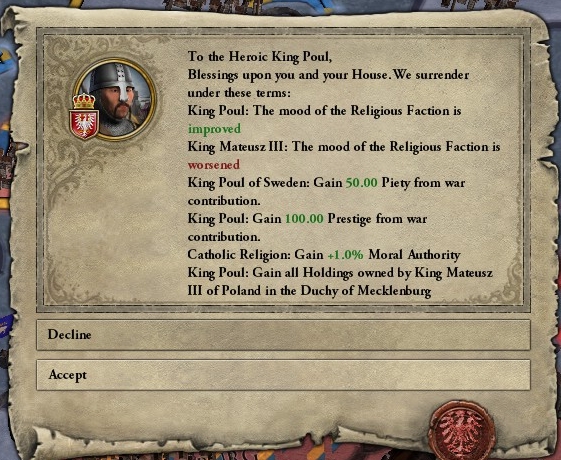
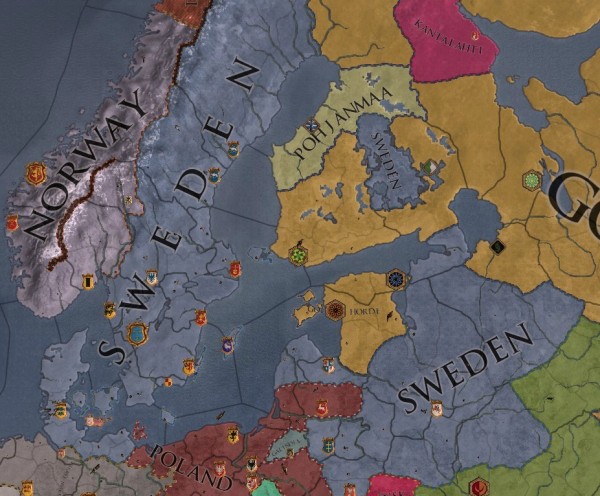
The campaign launched by Duke Gotfred in his final days was won easily enough; it had been in its final hours when Poul had taken the throne. It left a larger and stronger Sweden than ever before.
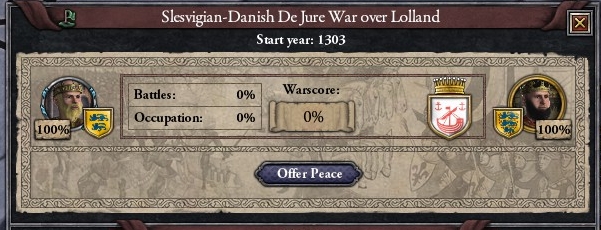
Strong enough for King Poul to launch a follow-up war to reclaim the last of the pretender-King's territory from the hated Norwegians.
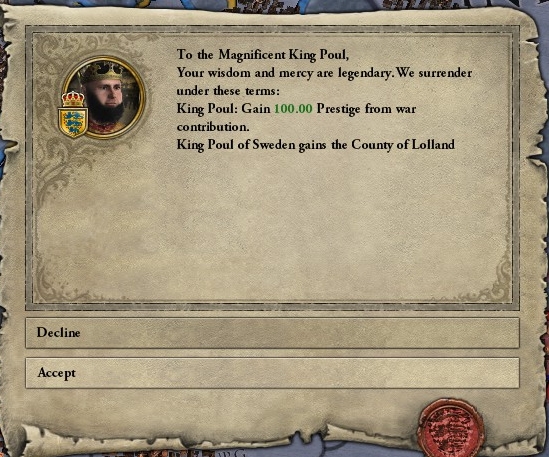
The campaign was one sided, with the 'King' of Denmark ceding the last of his Danish possessions. Once again, after all this time, Denmark stood re-united - albeit under Sweden.
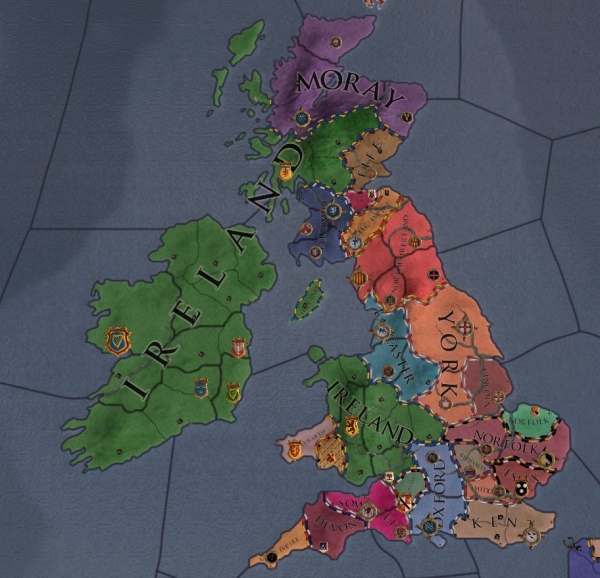
Elsewhere, the Kings of Ireland - formerly the rulers of Scotland - were working to reclaim the British Isles from the Aztec invaders.
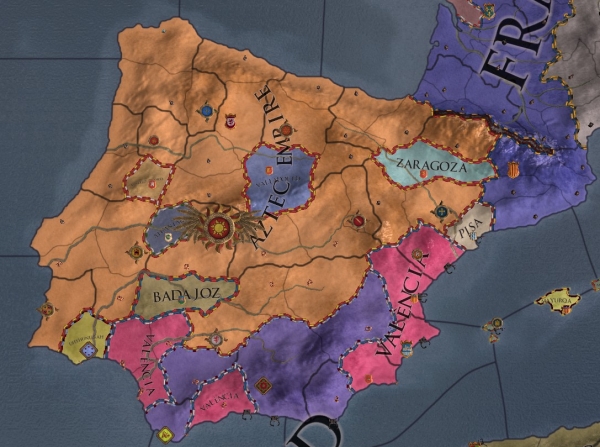
While this was going on, the Aztecs themselves were too concerned with their civil war and the invasions of both Christians and Muslims to hold more than Iberia. The Sunset Invasion had almost entirely collapsed due due to a combination of plague, greed and fights at home.
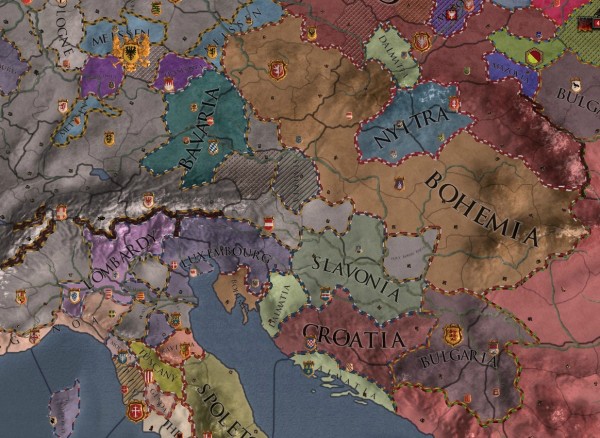
Still elsewhere, the Holy Roman Empire had almost entirely ceased to be. Huge swaths of the former Empire had seceded, citing religious differences. Without a strong church the divine right of Kings was called into question, and the pillars supporting the Emperor had crumbled.
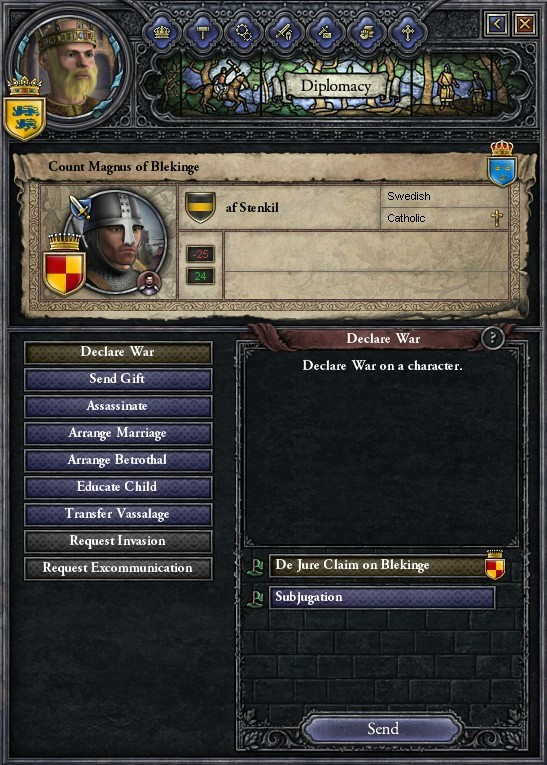
Back in Denmark, King Poul finished the last of his mopping up, enforcing his will over Blekinge - stolen from Denmark by Sweden over a hundred years ago.
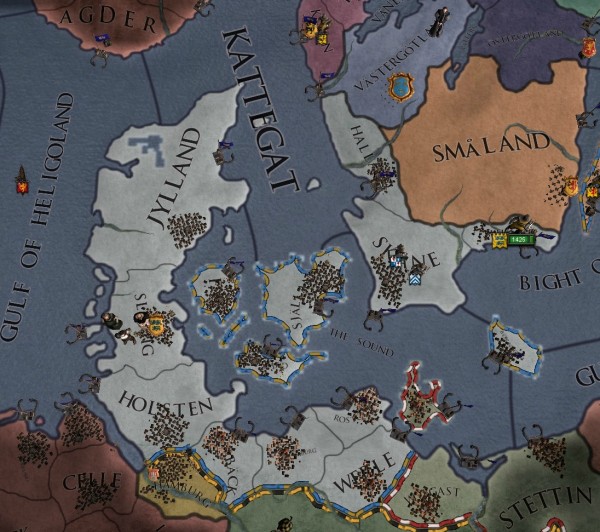
This was the end result: All the land of Denmark now existed under King Poul's direct rule. This land was extremely rich and prosperous and highly technologically advanced, especially in the fields of war. King Poul was able to call 20,000 men to war, which made him equal in power to the Queen herself - her land was larger but feuding and split between spiteful vassals. King Poul had direct control and unanimous support of all his vassals, making him a state within a state.
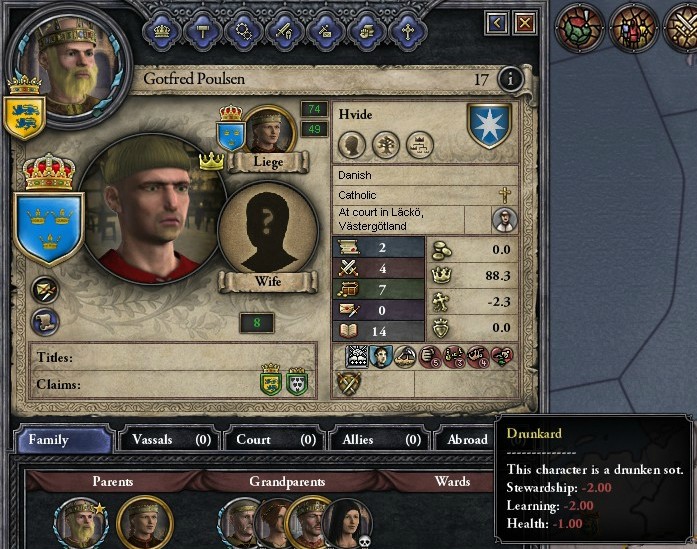
Succession was a problem. The heir to this united kingdom, Gotfred, was a drunk, a coward, and a brute. Many made grim predictions about his ability to manage a kingdom as large as this.
But there was no time for a peaceful discussion about inheritance law. The world was shaking to its foundations.
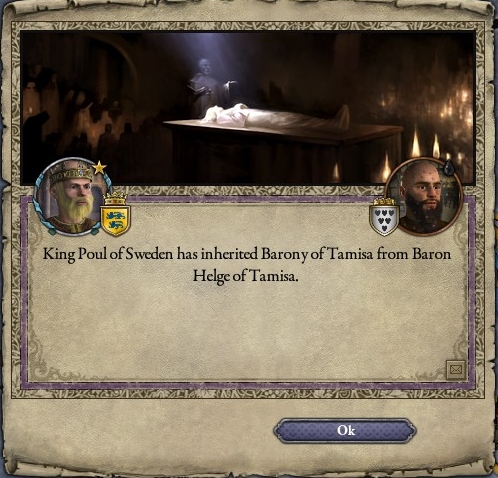
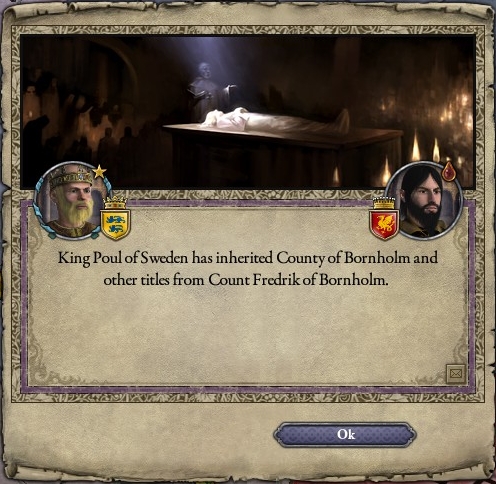
There was a sudden deluge of inheritances from distant relatives all across Europe, some from kingdoms as far away as Aztec Spain. King Poul tried to untangle the reason why he had wound up with territory on the other side of the world without warning
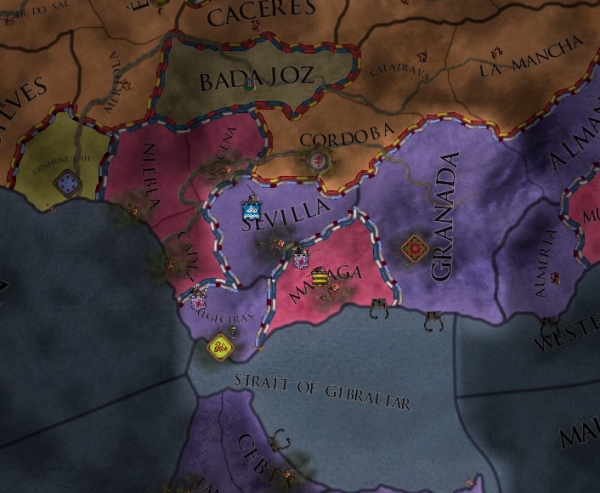
How had his family ever managed to acquire holdings in Spain? And why was he inheriting them now of all moments?
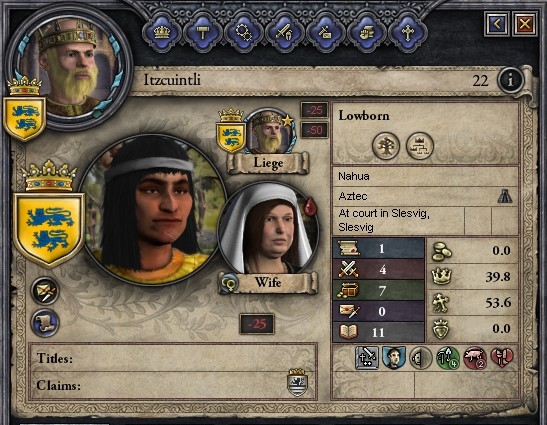
Oh

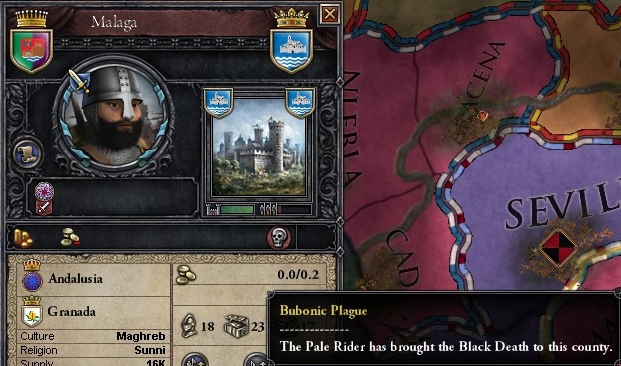
Oh

With Europe burning in the fires of the Bubonic Plague, Sweden closed its borders. A reasonable move, given that everyone else in the world was a Cathar. The move worked, and the Black Death never reached Scandinavia.
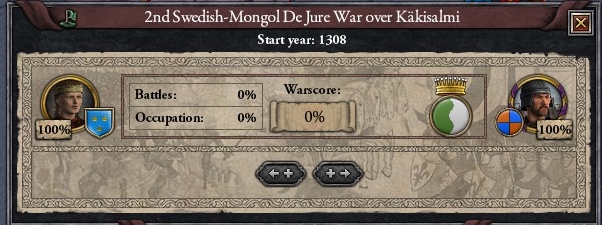
The Mongols came instead.
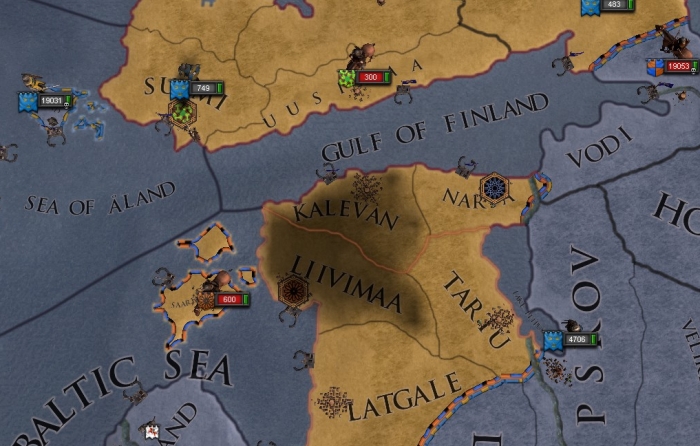
While the armies of the Queen marched out to deal with this apocalyptic threat, King Poul opted to make a counter-play.
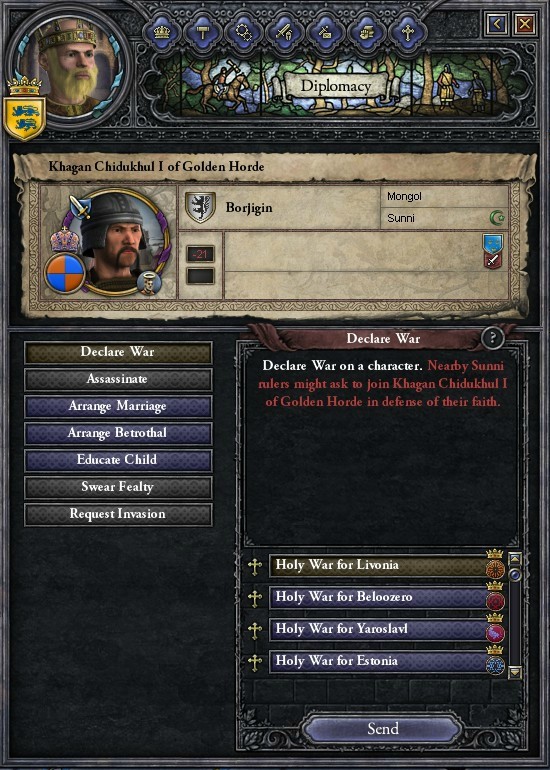
He met the invasion of the Mongols with an invasion of his own. It was a risky move - if Sweden won the war, then she'd gain territory rather than just hold it. If they lost, they'd make a weakened Catholic Church look even weaker.
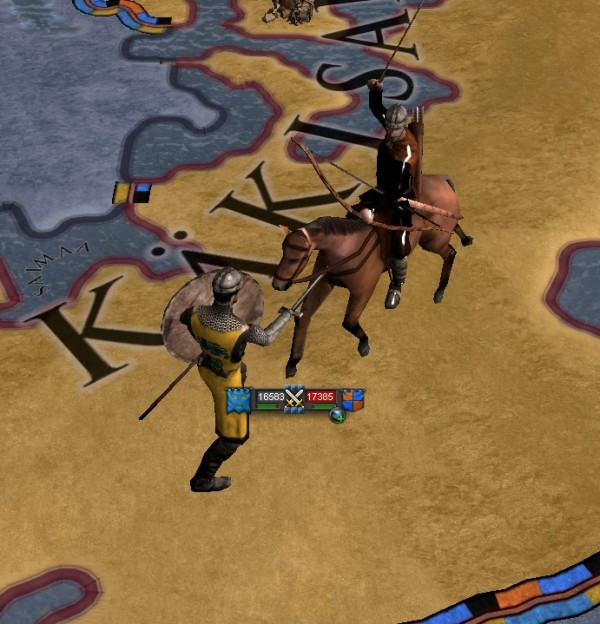
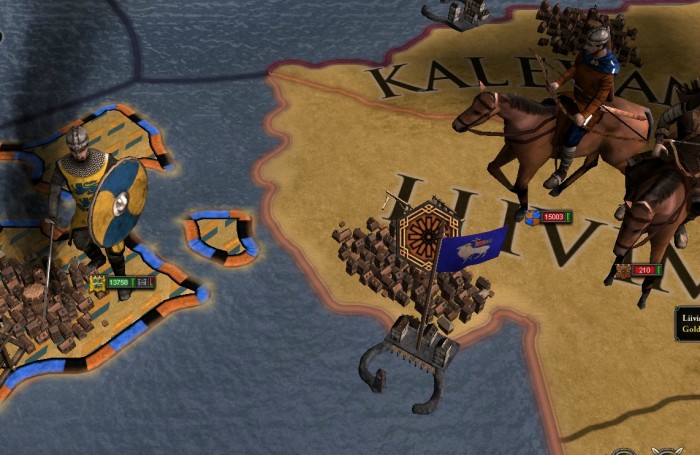
Hopes were not high as the Swedish army was crushed in Finland, and the Mongol army descended upon an outnumbered Danish army. The Danish had a positional advantage in holding an island but the numerical advantage was so great it likely would not matter.
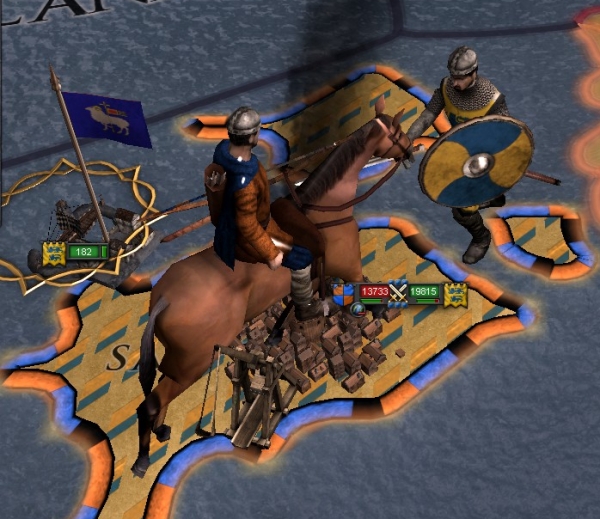
Until the surprise reinforcement of 7,000 mercenary troops just as the battle was beginning. That positional advantage turned into a decisive edge.
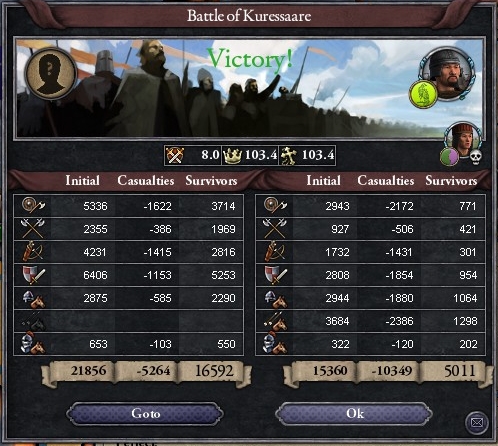
The Mongols were utterly crushed in one of the most spectacular military turnabouts of the 14th century. Thousands of prisoners were taken.
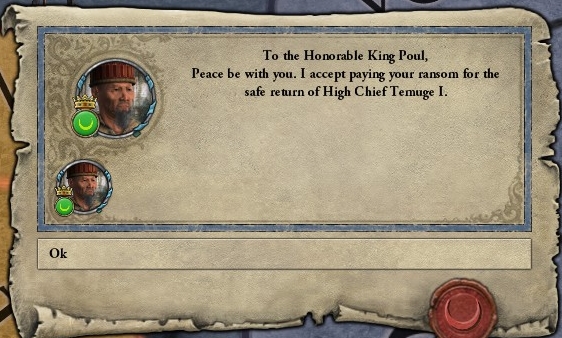
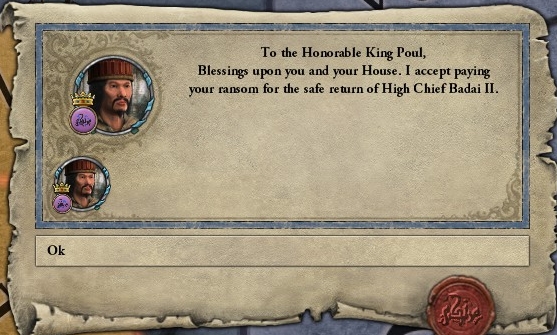
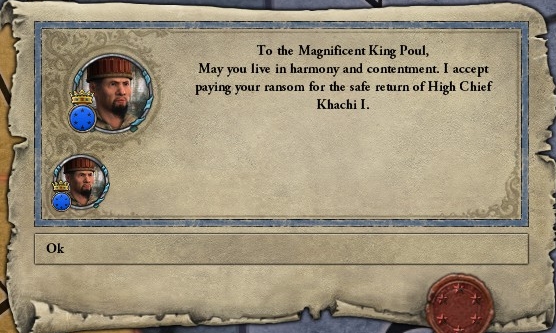
Which was an exceptionally lucky break, because their ransoms paid the wages of the mercenaries that had been necessary to defeat them.
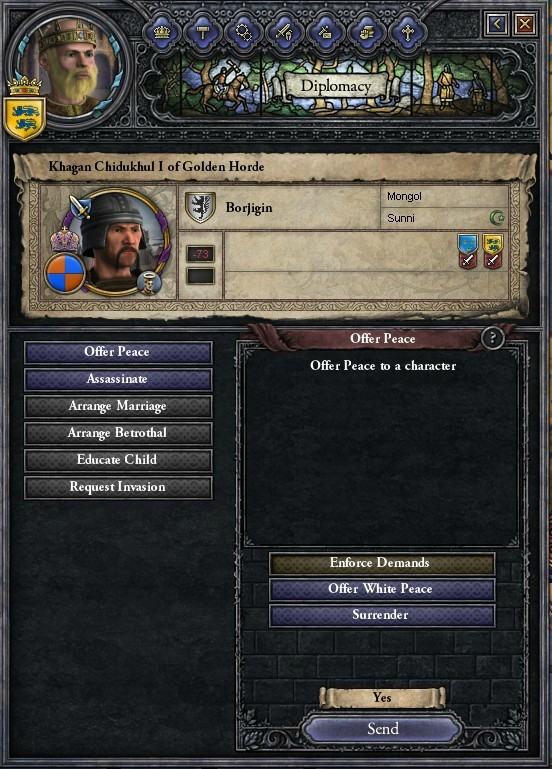
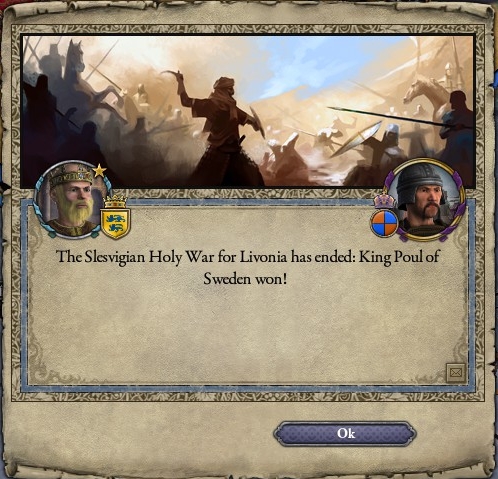
It was the first time a European power had taken land from one of the Khans. It would have been celebrated across the Catholic world if there was still a Catholic world.
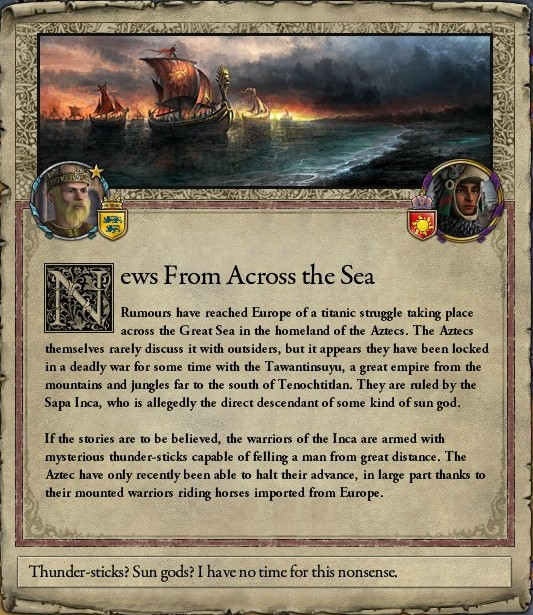
Meanwhile, the news from the Americas continued to trickle in. A strange war was going on between the Aztecs and their rivals on the content, the Incas. As chaos raged at home, Europe was able to breathe a little easier knowing that she had time to prepare herself.
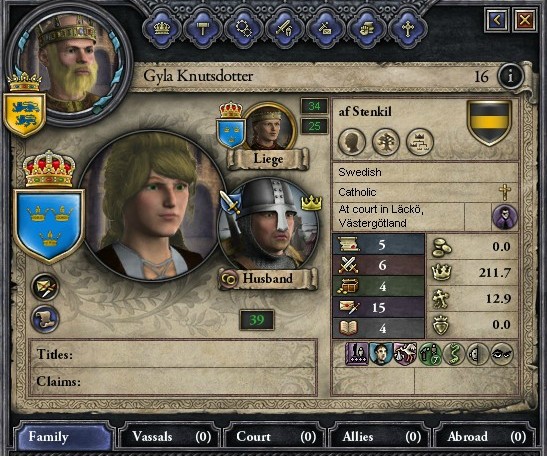
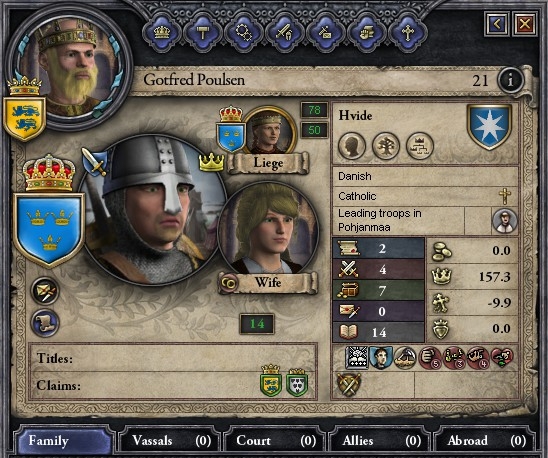
In further disappointing developments on the heir front, Gotfred had drunkenly married a local hedge witch and had made her pregnant. King Poul could only shake his head before heading off to deal with the next catastrophe.
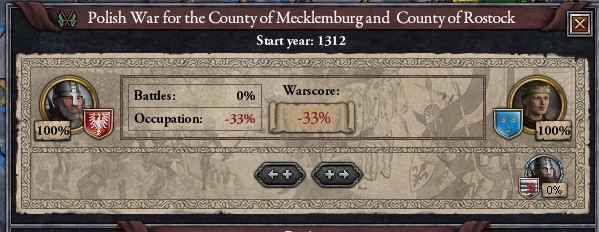
The Cathar Poles were invading, see, and King Poul had to put lecturing his drunken sot of a son on hold while he went to save the Cross from heretics.
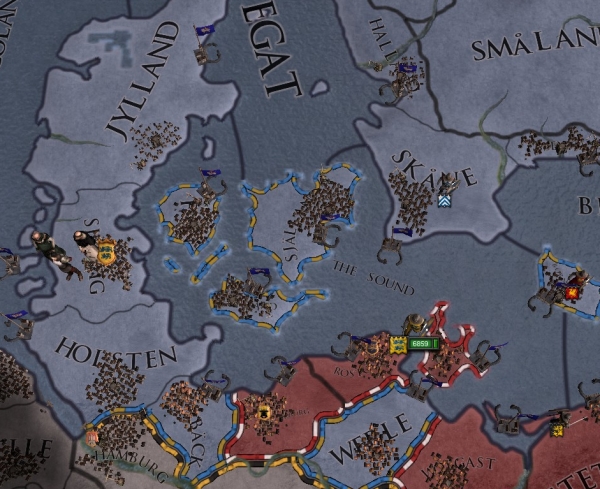
Unfortunately, with his armies exhausted from holding off the Mongols, the Scandinavians had to concede to the Poles' demands. This display of weakness was dire, because Sweden was now the last Catholic Kingdom on Earth.
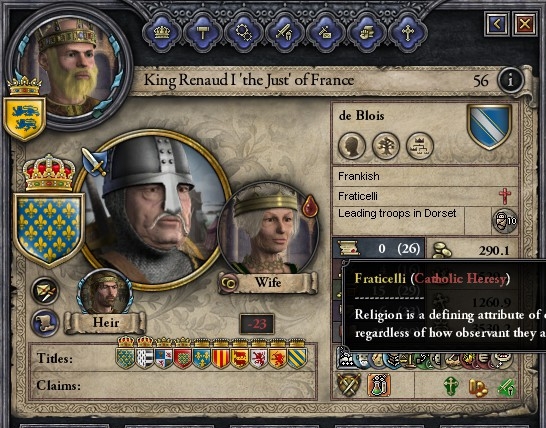
The French followed the teachings of Fraticelli that reigned in the West...
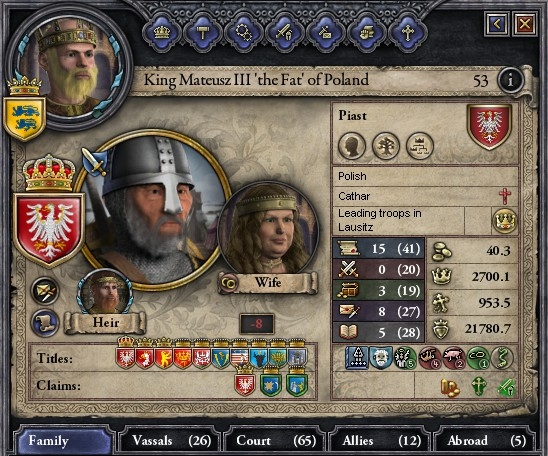
... the Poles had long followed the tradition of Catharism, that dominated the churches of the East...
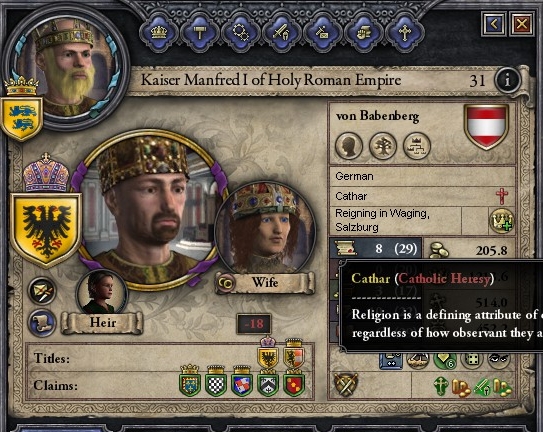
... and the Kaiser of the Holy Roman Empire had embraced the Catharism blighting his nation.
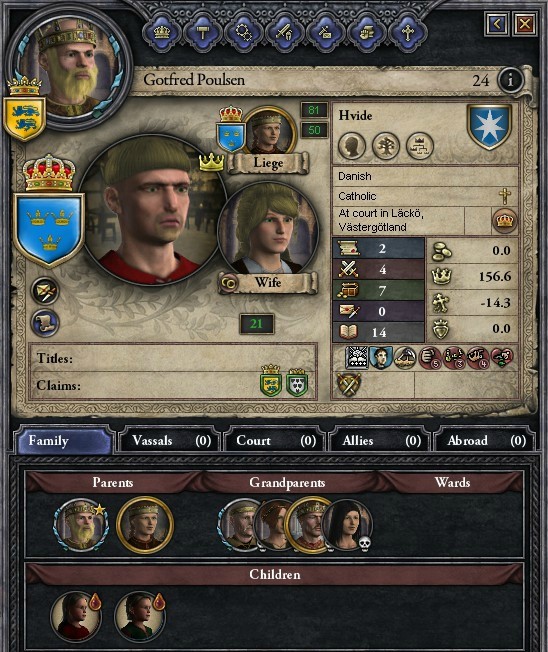
And when King Poul got back from the defeat, his son hadn't gotten any worse, but he hadn't gotten any better either.
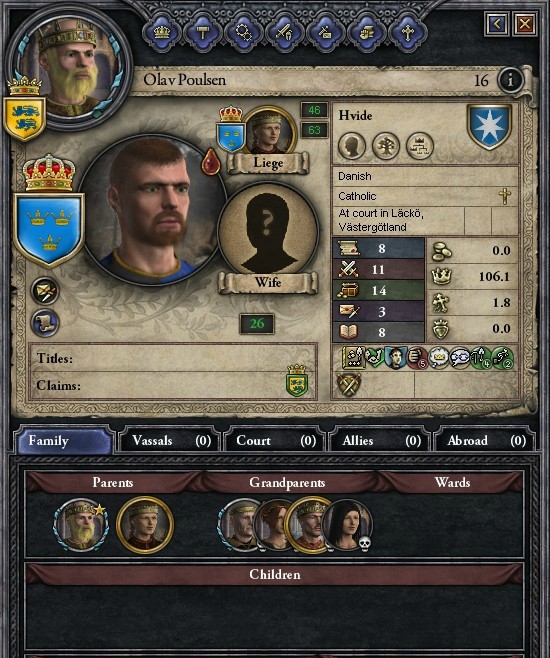
Unless you counted worse by comparison - the second born son was a virtual saint in comparison.
these two screenshots: crusaderkings2.jpg
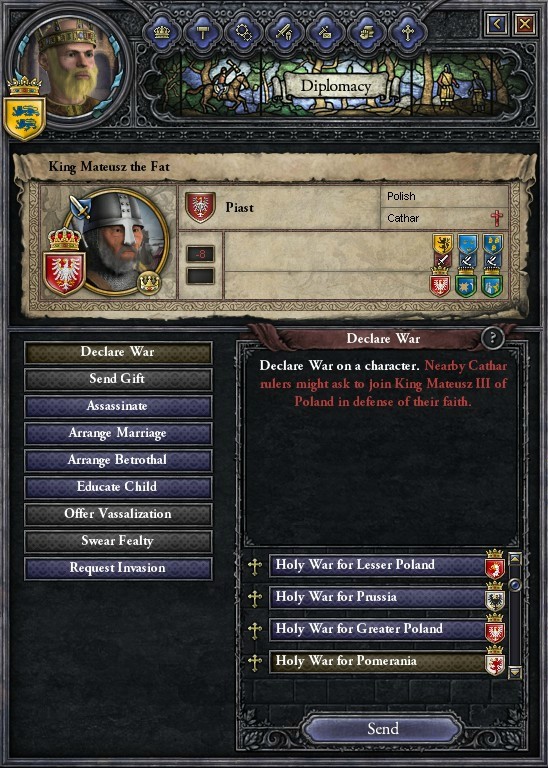
As usual, King Poul didn't have time to do any lecturing or try to sort anything out because it was straight back to war. This time, a lightning invasion of Poland as retribution for the stolen land.
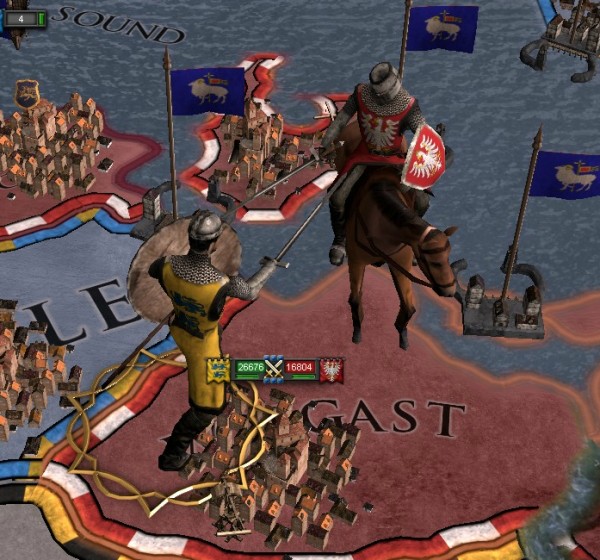
King Poul was not a military genius, but he was an expert at concentrating his forces. He made a point to never arrive at a battle he didn't have a clear numerical advantage in.
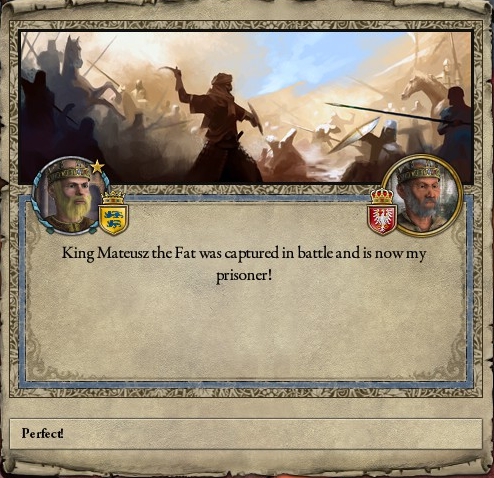
Another quirk of King Poul was that he always lead from the front. He was a duellist, and brave, and fought on the front lines of each of the increasingly deadly battles of the 14th century. That he never received so much as a papercut from a lifetime of constant war baffles historians. Many of his exploits, such as fighting his way through forty armoured knights and disabling the King of Poland with a single punch to the solar plexus, ending the war in its first battle, are dismissed as mere legend.
But those exploits were legends. People told the stories. With a world breaking apart, the Legend of the North as he came to be known stood as a mythic figure, towering over Khans and Kings and heretic Emperors.
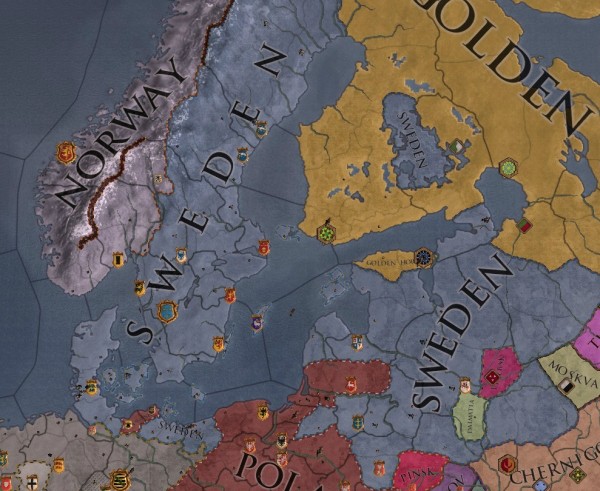
And stories or no, Sweden grew larger.
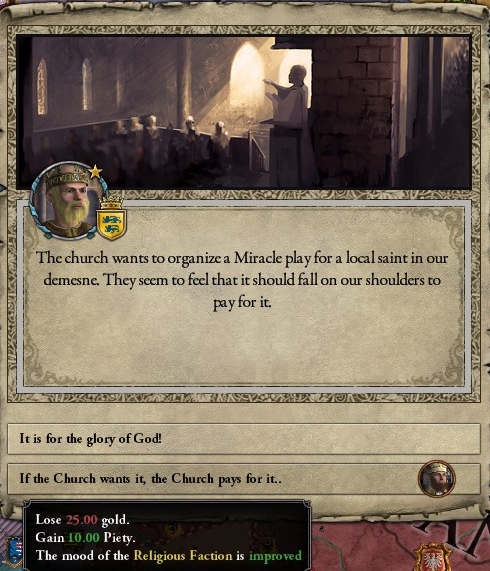
King Poul only had a few months in between wars, and he spent it - bafflingly - performing the role of Countess Christina's secretive and malicious mentor at a local Church function. The story goes that he was in the middle of introducing the young Christina to the Sorcerer of Gotland when a messenger burst into the hall and told the King that the Mongols were invading again and he was needed at the front.
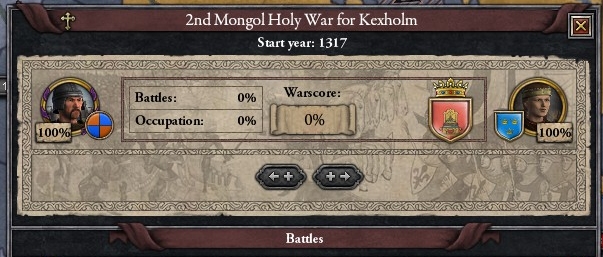
King Poul threw off his hood, put on his crown, and roared to the audience, "Who stands with me?"
An army of 26,000 left for Finland.
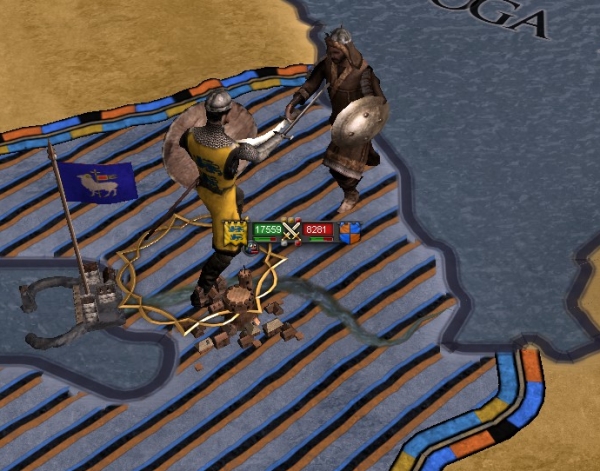
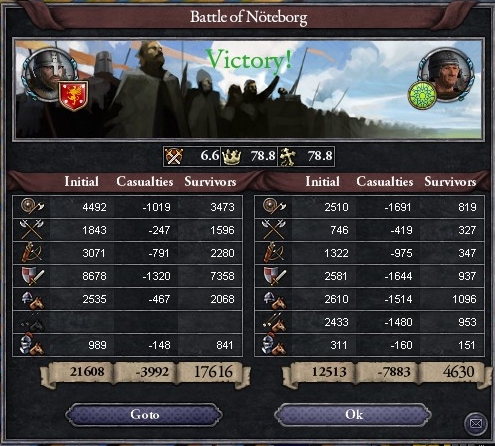
The Danes were by this point well familiar with the Mongol cavalry tactics, and achieved a crushing victory over the Mongol Khan.
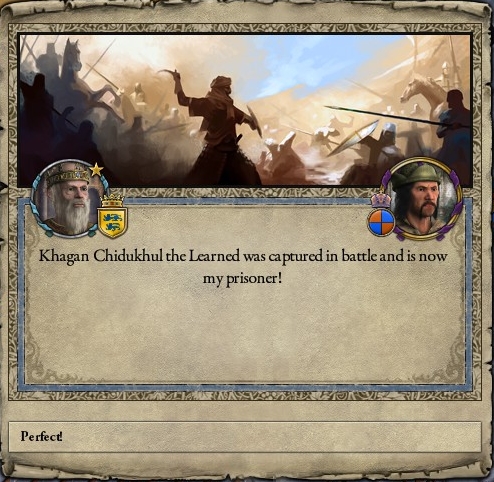
And the stories of how King Poul won the day were even more improbable than the last story. They say how his horse was shot out from under him at the start of the battle, so he took off his crown and threw it into the mud so no one would identify him as a ruler. Then he joined the heavy infantry line and walked into the melee, determined to claim a Mongol horse. Three times he killed a Mongol horseman and took their horse, and three more times his horse was shot out from under him. Out of frustration, he fought his way through the crowd to the Mongol archers determined to tell them to knock it off.
There he found the Mongol Khan, on horseback, aiming at him with a bow made out of gold. The Khan thought he was just a common soldier and was just as surprised as anyone when King Poul blocked the arrows, killed all four of the Khan's bodyguards, jumped onto the Khan's horse and held a dagger against his throat while instructing him to surrender.
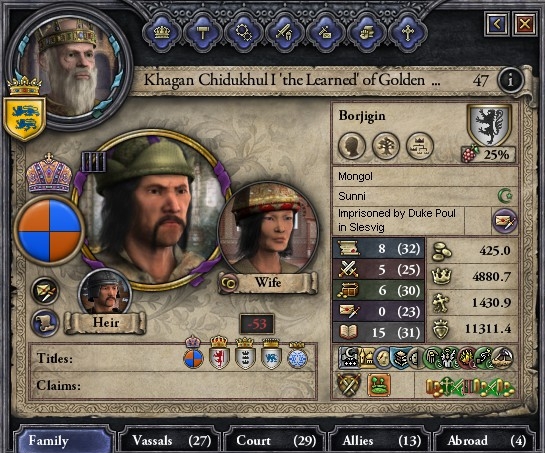
Khagan Chidukhul was known as 'The Learned', and was eager to talk. He had quite a long conversation with King Poul that night, speaking freely in the tongues of the Europeans. He told King Poul many interesting things about his land and his people, about Islam and about succession law.
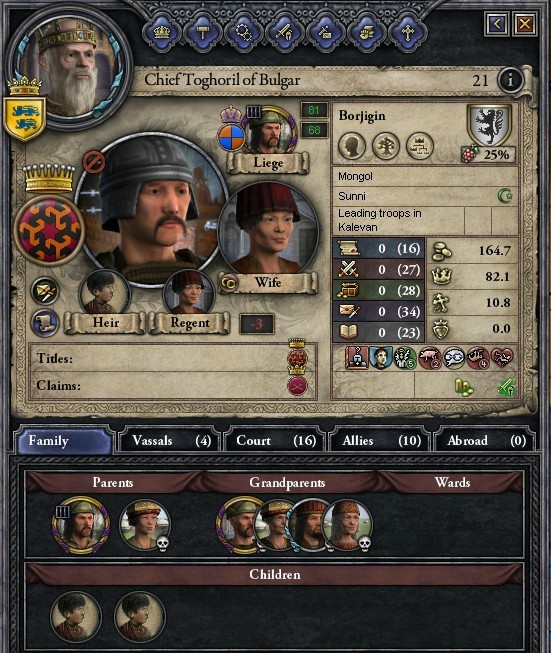
And he also guilelessly told King Poul that his son and heir was in a coma and may never awake. King Poul agreed that this was very sad and comforted the Mongol ruler.
"I know what it is to have a useless son," said King Poul. "I know that my country will likely be doomed once he is crowned."
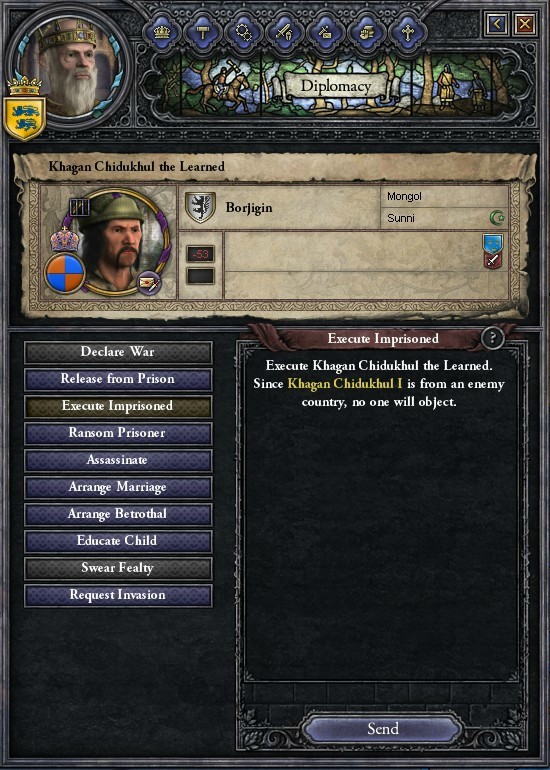
And then he cut the Khan's throat right then and there.
He took the Khan's crown and gave it to a terrified prisoner. "Go deliver this crown. Go doom your country," he said.
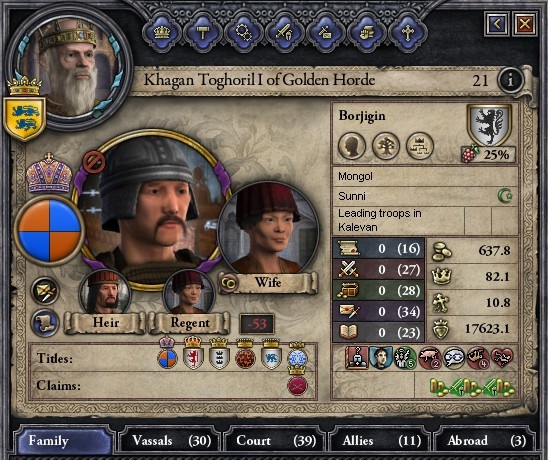
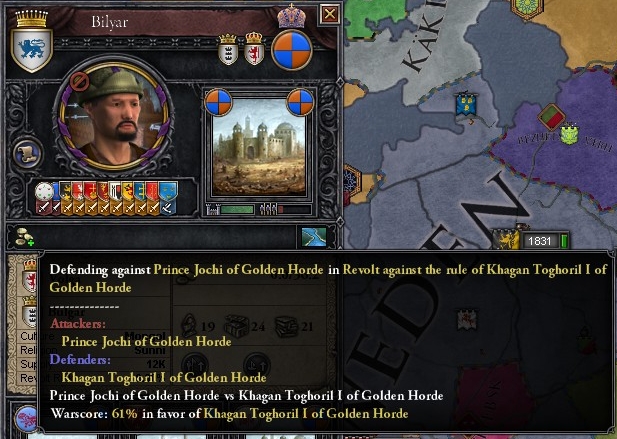
Sure enough, the comatose Toghoril was crowned Khagan of the Golden Horde. Sure enough, civil war broke out the next day.
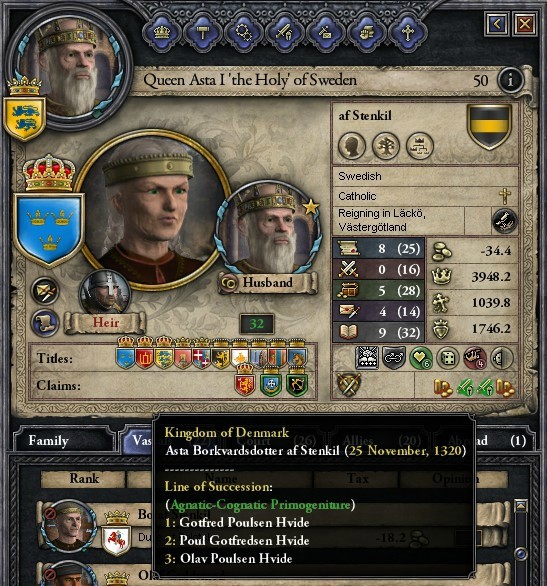
While King Poul had been fighting endlessly at the front lines of Christendom, Queen Asta had been performing a duty just as important - saving the soul of Catholicism itself. From all around the burning world she gathered Christian texts and books, invited Catholic scholars and commissioned religious artwork and architecture. With the world falling apart, Queen Asta made it her duty to ensure that some knowledge of the time before would survive. Her great libraries and contributions to knowledge and learning in Europe made her one of the most influential religious figures in the world - especially in comparison to an increasingly irrelevant Pope.
She also claimed the Crown of Denmark at long last, finally removing it from the Norwegians who had seized it so long ago.
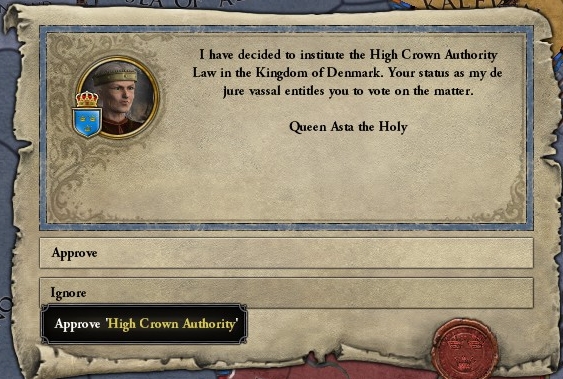
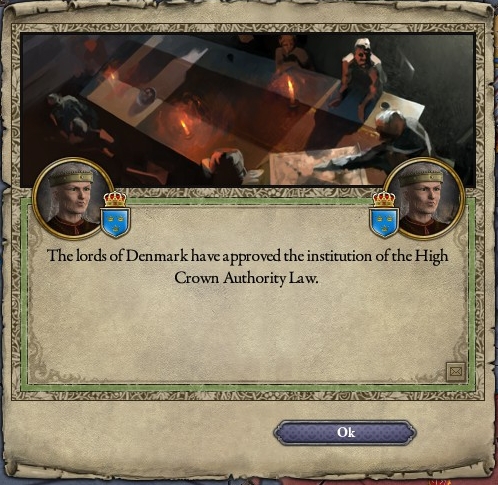
She and King Poul worked together to create the beginnings of a bureaucracy and civil service to manage this last, greatest bastion of the Christian faith. As two unexceptional people themselves, the King and Queen agreed that a dedicated core of civil servants would be more sustainable than trusting corruptible nobles and their heresies.
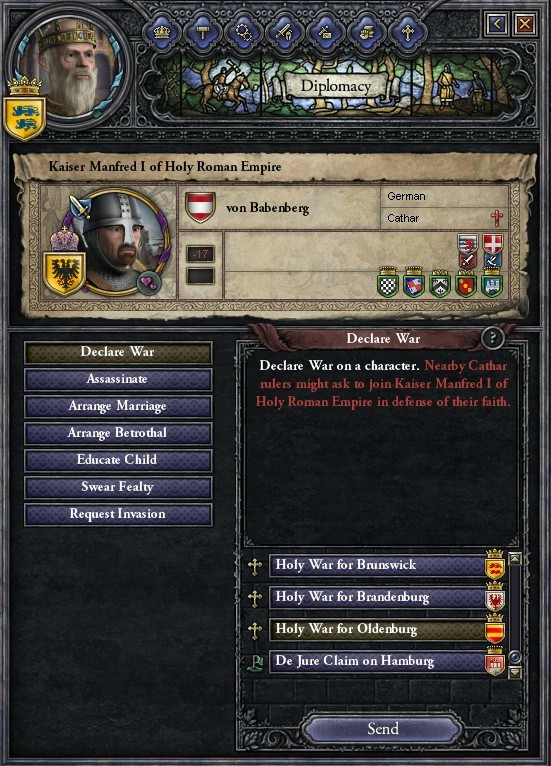
And then it was back to war. There was too much to be done for King Poul to rest on his laurels.
The Holy Roman Empire had lost its claim to that title once it had turned to Catharism. King Poul marched against what was once the greatest nation on earth to liberate the oppressed Catholics from the madness and heresy consuming the nation.
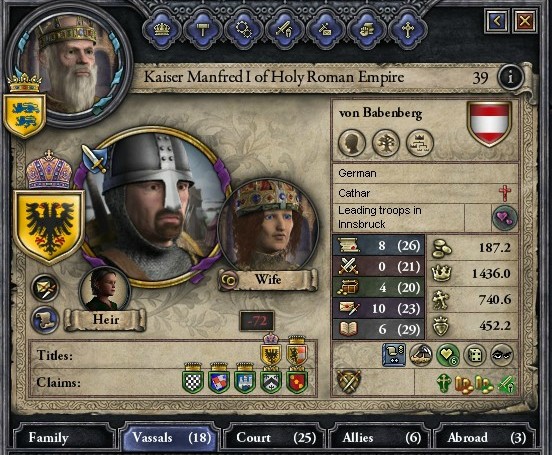
The Kaiser was a coward, petrified by the stories of the Legend of the North. He did not imagine his weak, divided kingdom could possibly overcome the righteous fury of King Poul. He refused to march to war himself and sent his armies in absentia.
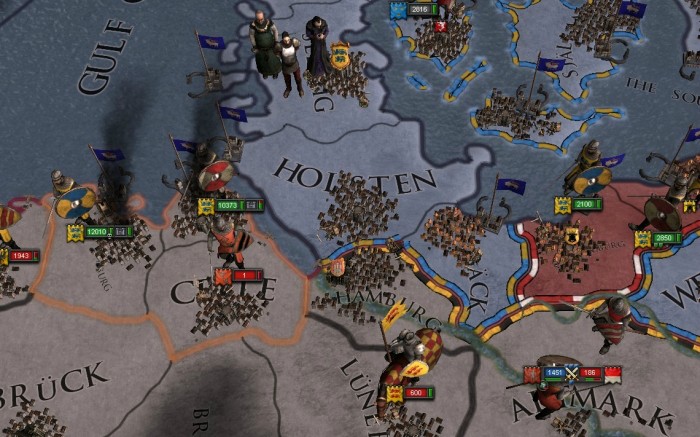
The defeats were crushing, as the scared and demoralised Germans were shattered by ranks of disciplined, veteran Huskarls.
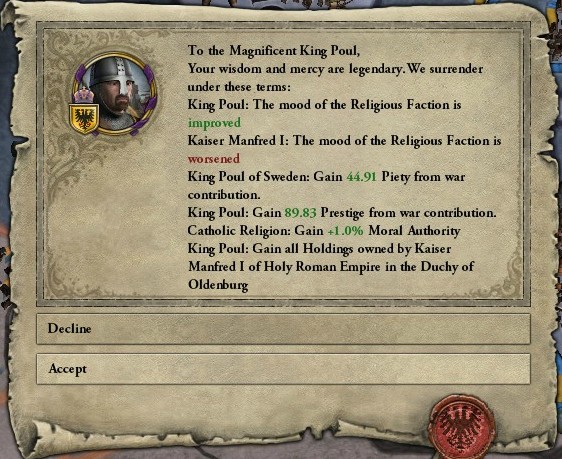
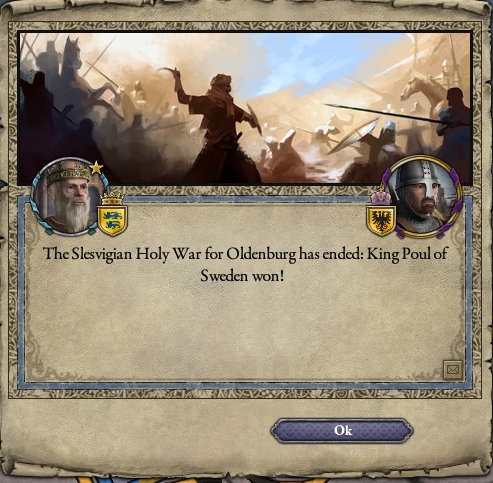
Before the campaign really began, the terrified Kaiser surrendered. King Poul's reputation had cowed even an Emperor.
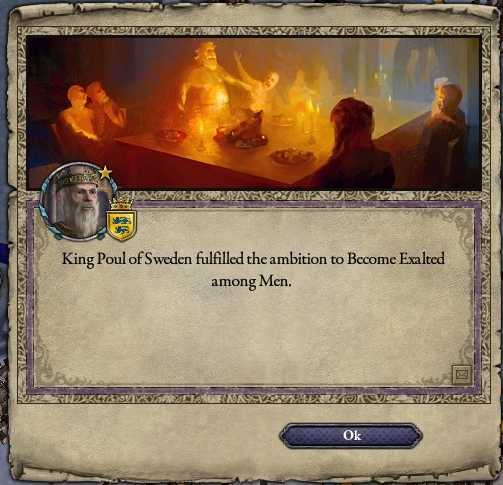
That was about when people started calling him 'The Great'.
King Poul was no Alexander, no Caesar. He had turned no battles with his military genius; the nations he had carved were tiny in comparison to the vast achievements of the Romans or the Greeks. But King Poul had fought his way to victory against two Emperors and two Kings and saved his Kingdom time and again from heretics and heathens alike. He had fought in every single battle of all his campaigns, leading from the front each time, and did not bear so much as a scar.
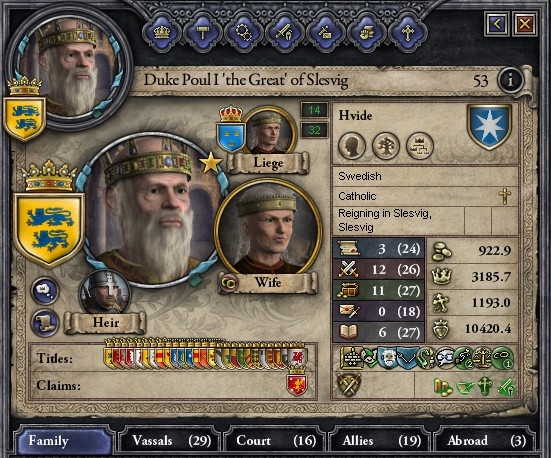
At age 53, this unremarkable man had refused defeat each time it seemed inevitable. He saved the Catholic Church from collapsing completely.
Greatness is what you do. And King Poul had done more than any one man had since the time of Charlemagne.
And he was just getting started.
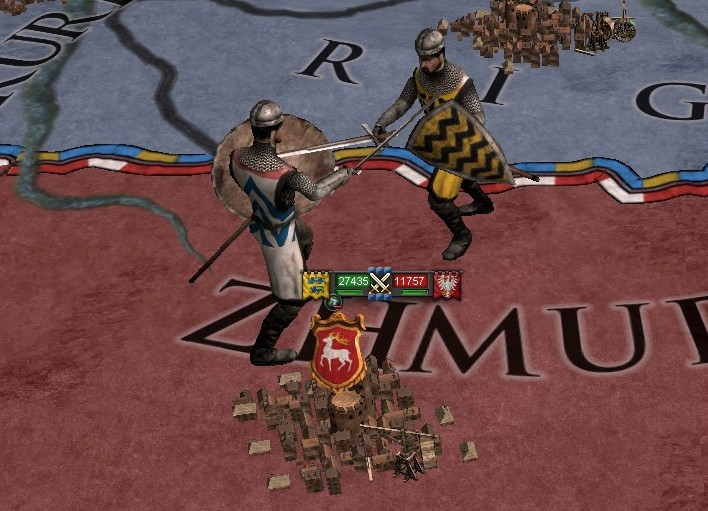
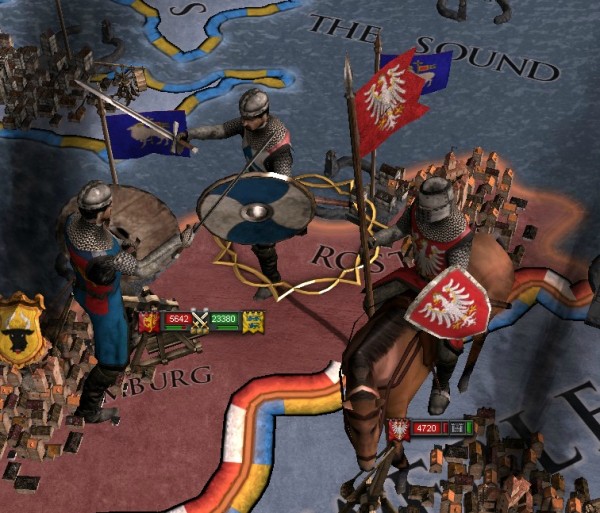
It was in the midst of yet another campaign - against the Poles for a third time, and the Norwegians too for some reason. He barely kept track, he was just focused on winning.
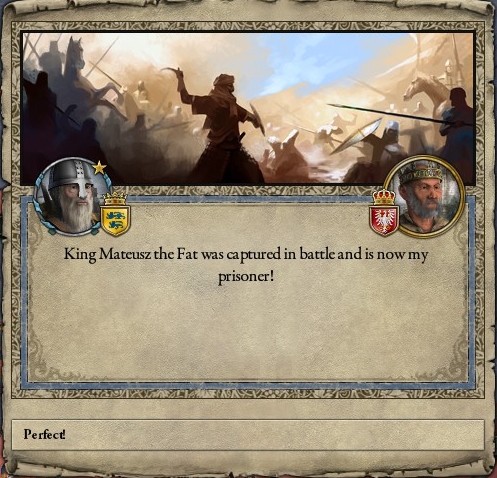
He had just welcomed the King of Poland back to his dungeons and was showing him that his shit bucket was exactly where he'd left it. He was about to start discussing surrender terms when a courier interrupted him with the news.
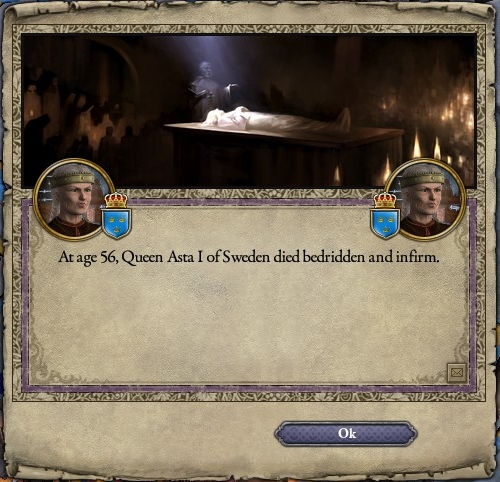
His wife, Queen Asta, had passed away peacefully. King Poul bowed his head and walked away from the battlefield. He did not return for many days. What he said, what he did, what he thought or what decisions he came to during that time, nobody knows.
But then he returned to the land of Sweden, axe in hand. He walked across all the land to the palace where his drunken son lived. When he walked into the room, his face was grim, set, decided. The guards flinched, but young Gotfred waved them away.
He smiled at his father. And then he gestured around at all the salmon-pink banners hanging from the walls.
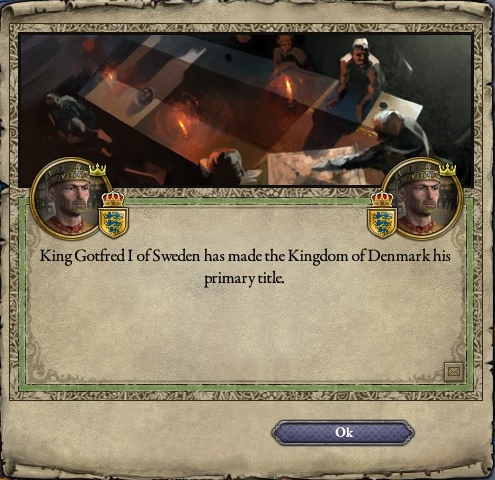
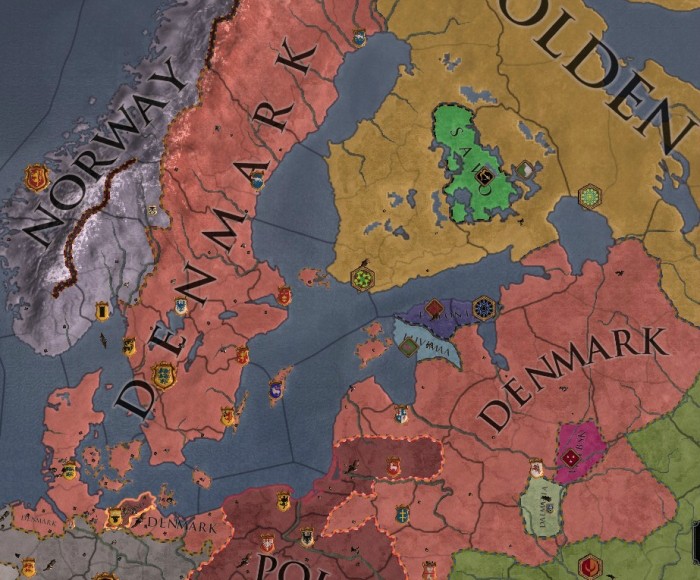
There is a hierarchy to Crowns. Some are more prestigious than others. There is also a careful political decision to be made when selecting your primary title. The Kingdom of Sweden is larger than Denmark, and filled with many more vassals. Those vassals would all be direly insulted to hear that their ruler considered Denmark a more important and prestigious title than Sweden. Denmark, which swore itself to Sweden's service! Wars had been waged over insults this dire.
In comparison, because King Poul had such a stranglehold over the Danish territories, the only person who cared about the name Denmark was him.
Which made this entire thing, the pissing off of every single vassal, the painting of every castle and every map, all one single, big expensive gesture from a son to honour his father.
This was all for him.
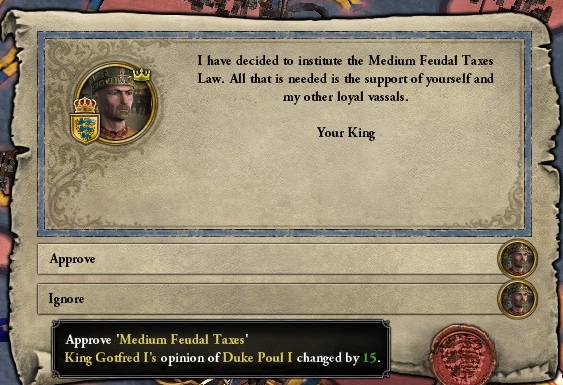
"Dad?" said King Gotfred seriously. "I need your help. I can't do this on my own."
And Duke Poul wiped away a tear, shook his son's hand, and said, "What first?"